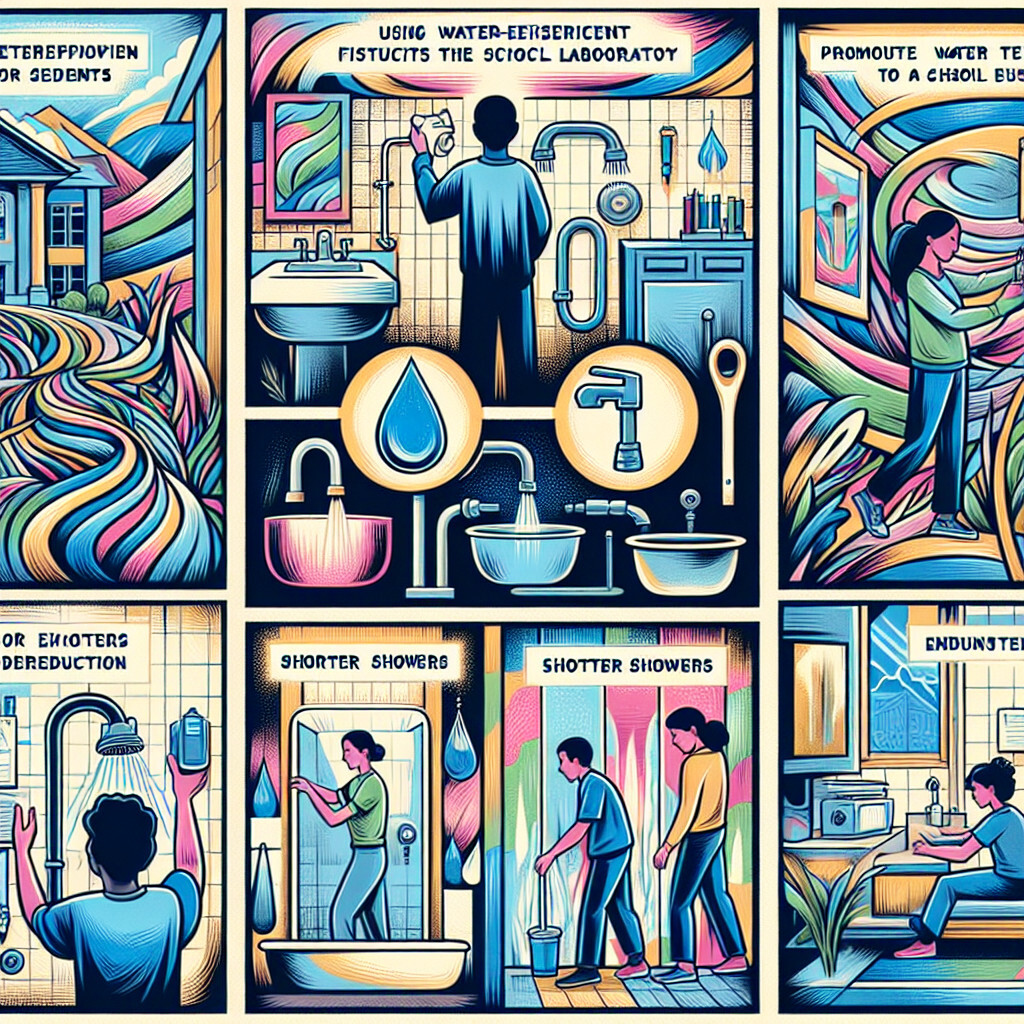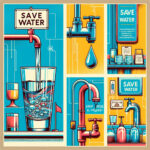-
Table of Contents
“Empowering Future Generations: Every Drop Counts, Save Water Today!”
Introduction

Water conservation tips for students is a guide that provides practical and effective methods to save water in daily life. It emphasizes the importance of water conservation in maintaining the balance of our ecosystem and ensuring the availability of this precious resource for future generations. The guide includes tips such as turning off taps when not in use, collecting rainwater, using water-efficient appliances, and spreading awareness about the importance of water conservation. It aims to instill in students a sense of responsibility towards the environment and encourage them to adopt sustainable practices.
Effective Water Conservation Strategies for College Students
Water conservation is a critical issue that affects everyone, including college students. As the world grapples with the reality of dwindling water resources, it is incumbent upon each one of us to take steps to conserve water. For college students, who often live in dormitories or shared apartments, there are numerous ways to contribute to water conservation efforts.
Firstly, one of the most effective strategies is to be mindful of water usage. This means being aware of how much water is used in daily activities and finding ways to reduce this amount. For instance, turning off the faucet while brushing teeth or shaving can save up to four gallons of water each minute. Similarly, taking shorter showers can significantly reduce water usage. A shower uses approximately 2.5 gallons of water per minute, so reducing shower time by just a few minutes can save a substantial amount of water over time.
Secondly, students can also conserve water by being mindful of their laundry habits. Instead of doing multiple small loads of laundry, it is more water-efficient to do one large load. This not only saves water but also reduces the amount of energy used by the washing machine. Additionally, using the appropriate water level setting on the washing machine can also contribute to water conservation.
Another effective strategy is to report leaks promptly. A small leak might not seem like a big deal, but over time, it can waste a significant amount of water. In a dormitory or apartment setting, it is important to report any leaks to the maintenance staff as soon as they are noticed.
Moreover, students can also contribute to water conservation by being mindful of their dishwashing habits. Instead of washing dishes under a running tap, it is more water-efficient to fill the sink with water and wash dishes in it. If a dishwasher is used, it should be fully loaded before running it, as dishwashers use the same amount of water regardless of how full they are.
Furthermore, students can also advocate for water conservation on their college campuses. This could involve starting a water conservation club, organizing awareness campaigns, or lobbying the college administration to implement water-saving measures. For instance, installing low-flow showerheads and faucets in dormitories and other campus buildings can significantly reduce water usage.
Lastly, students can also conserve water by choosing to drink tap water instead of bottled water. Bottled water production requires a significant amount of water, so choosing tap water can help to reduce this demand. If the taste of tap water is a concern, a water filter can be used to improve it.
In conclusion, water conservation is a shared responsibility that requires the active participation of everyone, including college students. By being mindful of their water usage and advocating for water conservation on their campuses, students can make a significant contribution to this important cause. Remember, every drop counts, so let’s start conserving water today.
Innovative Ways Students Can Contribute to Water Conservation
Water conservation is a critical issue that affects everyone, regardless of age or location. As the world’s population continues to grow, the demand for water increases, leading to a strain on our water resources. Students, as the future leaders and decision-makers, have a significant role to play in water conservation. They can contribute to water conservation in innovative ways, both at school and at home, and inspire others to do the same.
One innovative way students can contribute to water conservation is by practicing and promoting efficient water use. This can be as simple as turning off the tap while brushing their teeth or washing their hands, which can save up to eight gallons of water per day. They can also take shorter showers, use a water-efficient showerhead, and only run the dishwasher or washing machine with full loads. These small changes can make a big difference in conserving water.
In addition to these daily habits, students can also get involved in water conservation projects at school. For instance, they can start a water conservation club or campaign to raise awareness about the importance of saving water among their peers. They can organize events such as water conservation workshops, poster competitions, and water-saving challenges. These initiatives not only educate students about water conservation but also encourage them to take action.
Furthermore, students can contribute to water conservation by advocating for the installation of water-saving devices in their schools. These devices include dual-flush toilets, sensor-based taps, and rainwater harvesting systems. Dual-flush toilets use less water for liquid waste compared to solid waste, while sensor-based taps only release water when they detect movement. Rainwater harvesting systems collect and store rainwater for non-drinking purposes such as flushing toilets and watering plants. By advocating for these devices, students can help their schools save a significant amount of water.
Another innovative way students can contribute to water conservation is by conducting research on water-saving technologies and practices. They can explore topics such as water recycling, drought-resistant crops, and desalination. This research can be incorporated into their school projects or science fair exhibits, thereby spreading knowledge about water conservation to a wider audience.
Lastly, students can contribute to water conservation by practicing sustainable landscaping at home. This involves using native plants that require less water, grouping plants with similar water needs together, and using mulch to reduce evaporation. They can also install a drip irrigation system, which delivers water directly to the plant roots, thereby reducing water waste.
In conclusion, students have numerous innovative ways to contribute to water conservation. By practicing efficient water use, getting involved in water conservation projects at school, advocating for water-saving devices, conducting research on water-saving technologies and practices, and practicing sustainable landscaping at home, they can make a significant impact on water conservation. Moreover, by taking these actions, students can inspire others to do the same, thereby creating a ripple effect of water conservation efforts. Therefore, it is crucial for students to understand the importance of water conservation and take proactive steps to conserve this precious resource.
Practical Tips for Students to Save Water on Campus
Water conservation is a critical issue that affects us all, and it is particularly relevant for students who live on campus. As the future leaders of our society, students have a unique opportunity to make a significant impact on water conservation efforts. This article will provide practical tips for students to save water on campus.
Firstly, one of the most effective ways to conserve water is by reducing the amount of water used in daily activities. This can be achieved by adopting simple habits such as turning off the tap while brushing your teeth or shaving, which can save up to 200 gallons of water per month. Similarly, taking shorter showers can also significantly reduce water usage. A shower that lasts for 10 minutes can use up to 50 gallons of water, so reducing shower time by just a few minutes can result in substantial water savings.
Another practical tip for students is to be mindful of their laundry habits. Instead of doing multiple small loads of laundry, it is more water-efficient to do one large load. This not only saves water but also reduces the amount of energy used by the washing machine. Additionally, using the appropriate water level setting for the size of the load can further enhance water conservation efforts.
Furthermore, students can also contribute to water conservation by reporting leaks promptly. A small leak can waste as much as 20 gallons of water per day, and a larger leak can waste hundreds of gallons. Therefore, it is crucial to report any leaks to the campus maintenance department as soon as they are detected.
In addition to these individual actions, students can also advocate for water conservation at the institutional level. For instance, they can lobby for the installation of water-efficient appliances and fixtures in campus buildings. These include low-flow showerheads, dual-flush toilets, and water-efficient washing machines, which can significantly reduce the amount of water used on campus.
Moreover, students can also promote the use of native plants in campus landscaping. Native plants are adapted to the local climate and soil conditions, and therefore require less water than non-native species. This not only conserves water but also supports local biodiversity.
Lastly, education is a powerful tool for water conservation. Students can organize workshops, seminars, and awareness campaigns to educate their peers about the importance of water conservation and the practical steps they can take to save water. They can also use social media platforms to spread the message and engage a wider audience.
In conclusion, water conservation is a shared responsibility that requires the active participation of everyone, including students. By adopting water-saving habits, reporting leaks promptly, advocating for water-efficient practices, promoting the use of native plants, and educating others, students can make a significant contribution to water conservation efforts on campus. These actions not only benefit the environment but also help to foster a culture of sustainability that will benefit future generations.
The Role of Students in Promoting Water Conservation
Water conservation is a critical issue that demands immediate attention from all sectors of society, including students. As the future leaders and decision-makers, students play a pivotal role in promoting water conservation. They are not only capable of implementing water-saving measures in their daily lives but also have the potential to influence their peers, families, and communities to do the same.
Firstly, students can make a significant impact by adopting simple water-saving habits. For instance, turning off the tap while brushing teeth or washing hands can save several liters of water daily. Similarly, taking shorter showers, using a bucket instead of a hose to wash cars, and using the washing machine or dishwasher only when full are other practical ways students can conserve water. These small changes, when practiced consistently, can lead to substantial water savings.
Secondly, students can promote water conservation by becoming more conscious of their water usage. This involves understanding the value of water and the implications of its wastage. By learning about the water cycle, the sources of fresh water, and the challenges related to water scarcity, students can develop a deeper appreciation for this precious resource. This knowledge can then motivate them to use water more judiciously and encourage others to do the same.
Moreover, students can take the initiative to spread awareness about water conservation in their schools and communities. They can organize campaigns, workshops, or competitions that highlight the importance of saving water. They can also use social media platforms to share water-saving tips and facts about water scarcity. By doing so, they can inspire others to join the cause and contribute to water conservation efforts.
In addition, students can advocate for water conservation policies at their schools. For example, they can propose the installation of water-efficient appliances and fixtures, such as dual-flush toilets and low-flow showerheads. They can also suggest the implementation of rainwater harvesting systems or the creation of a school garden that uses drought-tolerant plants. These initiatives not only conserve water but also serve as tangible demonstrations of the school’s commitment to sustainability.
Furthermore, students can engage in research projects or science experiments that explore innovative ways to conserve water. This could involve studying the effectiveness of different water-saving devices or investigating the potential of alternative water sources, such as greywater or recycled water. Such projects not only enhance students’ understanding of water conservation but also contribute to the broader knowledge base on this topic.
Lastly, students can play a role in water conservation by participating in community service activities related to this issue. They can volunteer for river clean-up drives, tree planting events, or water conservation awareness programs. These experiences not only allow students to make a direct contribution to water conservation but also provide them with valuable life skills and a sense of civic responsibility.
In conclusion, students have a crucial role to play in promoting water conservation. Through their actions, attitudes, and advocacy, they can make a meaningful difference in addressing this global challenge. Therefore, it is essential to empower students with the knowledge, skills, and opportunities they need to champion water conservation, both now and in the future.
Q&A
1. Question: What are some simple ways students can conserve water at school?
Answer: Students can conserve water at school by turning off faucets completely after use, reporting leaks to maintenance immediately, using refillable water bottles instead of disposable ones, and encouraging their school to install water-efficient appliances.
2. Question: How can students conserve water at home?
Answer: Students can conserve water at home by taking shorter showers, not leaving the water running while brushing their teeth, only running full loads in the dishwasher or washing machine, and watering plants during the cooler parts of the day to reduce evaporation.
3. Question: What role can students play in promoting water conservation in their communities?
Answer: Students can promote water conservation in their communities by educating their friends, family, and neighbors about the importance of saving water, organizing or participating in local water conservation projects, and advocating for water-efficient policies at their schools and local government.
4. Question: Why is it important for students to learn about water conservation?
Answer: It’s important for students to learn about water conservation because water is a finite resource. Understanding how to use it responsibly ensures its availability for future generations. Additionally, it teaches them about sustainability and environmental stewardship, which are important values in today’s world.
Conclusion
In conclusion, students play a crucial role in water conservation. By adopting simple practices such as turning off taps when not in use, collecting rainwater for gardening, fixing leaks promptly, and using water-efficient appliances, they can significantly reduce water wastage. Additionally, spreading awareness about the importance of water conservation in their schools and communities can further amplify their impact. Therefore, it’s essential for students to understand and implement water conservation tips in their daily lives to contribute to a sustainable future.






